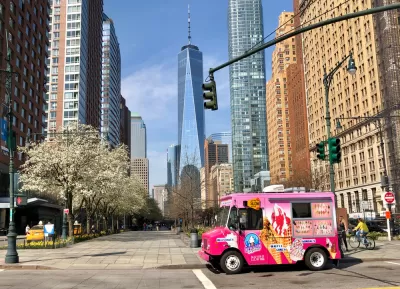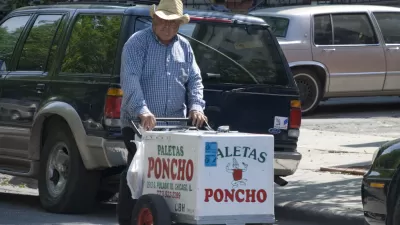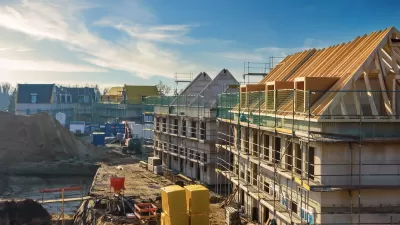From garbage pickers to tamale sellers, workers in the informal economy can account for half the workforce in developing cities. They should be respected as an important constituency.

Street Vendors contribute a vital part of city life, whether they're selling tea from the back of their bikes or carrying a cooler of tamales, they should be treated as an important resource Tanvi Misra argues in a piece for CityLab. "And yet they face numerous barriers to economic, political, and social integration—many of which are set up by the city itself. This is a common state of affairs in the urban centers of developing countries, but it doesn’t have to be," Misra writes.
Cities could do a lot for these vendors, by giving out more permits, and having strict oversite and greater transparency to avoid the corruption that can be part of that process. "Informal workers—like street vendors, waste-pickers who earn money for recycling trash; people who make textiles, garments, shoes, electronics, and other products at home—make up 50 to 80 percent of employment of cities in developing countries," Misra reports.
A World Resource Institute paper suggests three strategies to aid this vital part of cities:
- Increased access to public resources
- Revised laws to include informal workers in decision making
- Greater integration of informal workers into the local government
FULL STORY: Why Cities Should Support, Not Exclude, Street Vendors

Alabama: Trump Terminates Settlements for Black Communities Harmed By Raw Sewage
Trump deemed the landmark civil rights agreement “illegal DEI and environmental justice policy.”

Study: Maui’s Plan to Convert Vacation Rentals to Long-Term Housing Could Cause Nearly $1 Billion Economic Loss
The plan would reduce visitor accommodation by 25% resulting in 1,900 jobs lost.

Planetizen Federal Action Tracker
A weekly monitor of how Trump’s orders and actions are impacting planners and planning in America.

Waymo Gets Permission to Map SF’s Market Street
If allowed to operate on the traffic-restricted street, Waymo’s autonomous taxis would have a leg up over ride-hailing competitors — and counter the city’s efforts to grow bike and pedestrian on the thoroughfare.

Parklet Symposium Highlights the Success of Shared Spaces
Parklets got a boost during the Covid-19 pandemic, when the concept was translated to outdoor dining programs that offered restaurants a lifeline during the shutdown.

Federal Homelessness Agency Places Entire Staff on Leave
The U.S. Interagency Council on Homelessness is the only federal agency dedicated to preventing and ending homelessness.
Urban Design for Planners 1: Software Tools
This six-course series explores essential urban design concepts using open source software and equips planners with the tools they need to participate fully in the urban design process.
Planning for Universal Design
Learn the tools for implementing Universal Design in planning regulations.
Caltrans
Smith Gee Studio
Institute for Housing and Urban Development Studies (IHS)
City of Grandview
Harvard GSD Executive Education
Toledo-Lucas County Plan Commissions
Salt Lake City
NYU Wagner Graduate School of Public Service





























